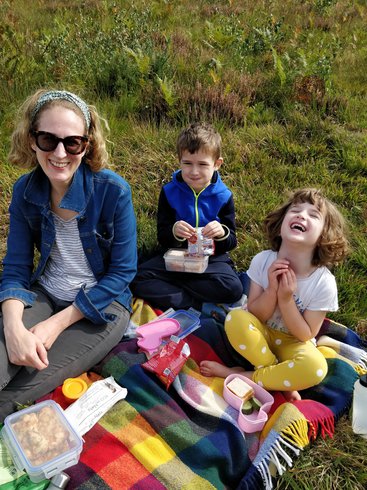Stories of Women in STEM: Helen Rowntree, Blood Cancer UK
I was delighted to have the opportunity to get to know Helen, Director of Research, Services and Engagement at Blood Cancer UK. We talked about her career path, how she’s successfully managed to juggle progressing whilst raising a family, and her views on inclusivity in the health sector.
Helen joined Blood Cancer UK in 2019 and leads their mission by funding lifesaving research, providing the information and services that people need, and campaigning on the issues that matter to people with blood cancer.
Prior to Blood Cancer UK, Helen worked at a senior level in the NHS leading the development of digital services for patients and managing the team at nhs.uk. Throughout her career in health, Helen’s worked to use technology and data to make people’s lives easier and make the complex more simple.
You’ve had what looks like a pretty focused career in health, did you always know what you wanted to do?
I ended up in health quite accidentally. I always knew that working for social good was important to me, but didn’t have a clear idea of where that would take me. But increasingly I became really interested in health policy, and power dynamics and motivated by how patients might be able to be more empowered and take control of their health. Initially, that was in relation to giving patients access to data about healthcare organisations, when I worked at a company called Dr Foster. But then I moved into the digital space, and started to lead on developing digital products and services, and digital strategy for health and care, in the NHS.
You’ve successfully managed to progress to a senior position, whilst raising a family, which is great to see. Any advice for other ambitious mothers?
I can only really talk about my experience. I’m definitely not qualified to give anyone advice. But what I would say is that there have been moments in my career when I have had to weigh up decisions about progressing my career, with decisions about my family. And I know that has been the experience of lots of other women, and really feel that it shouldn’t have to be this way.
Since I have had children, I do think it’s made me better at my job. I’m more able to think about what’s important, I’m more productive - and use my time wisely. I’ve also learned to think less about my career as a ladder, and more like a garden, focusing on growth and development, and less on progression.
But there have definitely been moments when it’s been difficult, particularly over the last year, and I think all parents who have been trying to work and homeschool have done an incredible job just to make it through.

How do you try and encourage an inclusive recruitment process?
Building an inclusive team is so important. The best performing teams I’ve worked with have always been the most diverse.
Across Blood Cancer UK we’ve made some changes to our recruitment over the last six months to try and address this. We’ve moved to blind recruitment - so recruiting managers don’t see any personal information about applicants. We now share interview questions in advance and think really carefully about our interview panels, particularly as these could be your first encounter with us.
We’re a relatively small organisation, and the change that is required is across the whole not profit sector and broader health and research systems, but we want to do better and keep challenging ourselves.
What do you think needs to change so that women can progress while juggling childcare commitments?
I think the main thing that needs to change is that we need to normalise flexible working. And that’s for the benefit of everyone, not just women with children. I’m really hopeful that one of the lasting changes that will result from the pandemic, is that more organisations, like ours, will move to flexible and hybrid home-office working, so that this becomes the norm.
It’s also great to see more and more examples of parenting being a shared responsibility and men working part time or flexibly.
But we have so far to go. Childcare is still really expensive and inaccessible for some people. There are lots of sectors or jobs and working cultures where progress still feels a long way off.
Is there anything you would’ve done differently?
I feel hugely grateful and privileged for the experiences I have had. But I think it took me some time to appreciate how important organisation culture is, and what values were really critical for me in the workplace. The culture we have at Blood Cancer UK is something that as a team we are all really proud of, and work at hard. I feel like our values as an organisation are meaningful and we feel really passionate about what we do and the impact we have. I can honestly say that I absolutely love my job.

